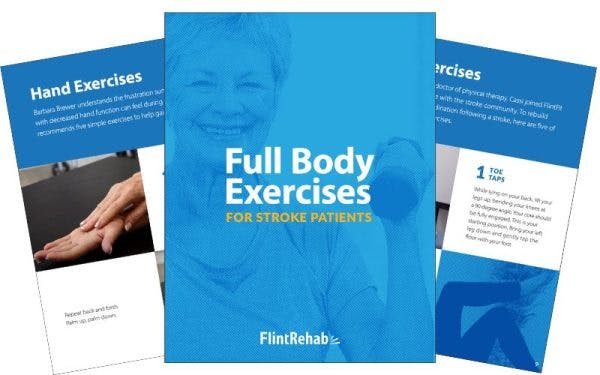Buzz is growing around the use of magnesium oil for stroke recovery. Does it carry potential for boosting recovery? Or is this just a fad with no supporting evidence?
You’re about to find out.
The Connection Between Magnesium and Stroke
Magnesium is the fourth most abundant mineral in the body. [NCBI]
It’s responsible for a host of different functions like blood pressure, insulin metabolism, muscular contraction, nerve transmission, and neuromuscular conduction.
Magnesium’s role in neuromuscular function is likely the reason for its growing popularity in the treatment of neurological disorders like stroke.
A stroke occurs when the supply of blood in the brain is compromised by either a blocked or burst artery. This leads to the death of brain cells that are deprived of oxygen-rich blood until the stroke has been treated and normal blood flow is restored.
When the motor cortex of the brain is damaged by stroke, it can result in motor impairments. When the brain cannot send proper signals to the muscles anymore, patients experience difficulty producing movement with their arms and legs.
Therefore, because a stroke interrupts the connection between the brain and muscles and magnesium affects neuromuscular conduction, there may be a connection between stroke recovery and magnesium.
But the question is, how?
Magnesium for Stroke Treatment and Prevention
Studies analyzing the link between stroke risk and magnesium levels have shown mixed results. [NCBI]
On one hand, low magnesium levels have been linked to higher mortality rates in patients after a new ischemic stroke. [PubMed]
Unfortunately, this means that patients who are low in magnesium are more likely to die after the onset of an ischemic stroke.
This would imply that magnesium offers a neuroprotective effect against ischemic strokes.
However, more studies are needed to confirm this connection.
It’s also worth noting that the studies on magnesium and stroke have focused on stroke treatment and prevention only.
But what about the role of magnesium in stroke recovery?
Use of Magnesium Oil for Stroke Recovery
There is little to no evidence supporting magnesium oil for stroke recovery.
Most reputable clinical trials were conducted on the impact of magnesium during the onset of stroke. Further studies are needed to analyze the impact of magnesium after stroke during rehabilitation.
However, we have heard via word of mouth that applying magnesium oil on the affected muscles helps improve mobility after stroke. But is this true?
This potential phenomenon could be caused by a host of reasons.
First, the stimulation from massaging the affected muscles could provide a therapeutic effect and help stimulate the brain. Second, the placebo effect could also play a strong role.
But most importantly, the idea of magnesium oil for stroke recovery provides hope. And when a stroke survivor is desperate for a solution to their motor problems, this hope can motivate other productive action.
For example, it’s likely that patients using magnesium oil are more motivated to practice therapeutic rehabilitation exercises after applying the topical mineral solution.
And this movement is the key to recovery.
A Proven Solution for Stroke Recovery
Whether or not magnesium oil helps the brain and muscles communicate is unknown.
But what researchers do know is that repetitive movement helps improve the brain-muscle connection through neuroplasticity after stroke.
Neuroplasticity is the process to describe how the brain can recover by forming new neural pathways to the injured areas.
After stroke, neuroplasticity allows healthy parts of the brain to take over the functions that the damaged areas once controlled.
This is how patients can improve their strength, mobility, and daily activity after stroke. Through neuroplasticity and practice, patients can regain control of movements or learn new ways to accomplish everyday tasks.
Therapeutic exercise is the best rehabilitation technique for stroke recovery.
Whether or not you add magnesium oil depends upon both your risk factors and curiosity.
Is Magnesium Oil for Stroke Recovery Safe?
According to WebMD, magnesium is considered safe at doses of 310mg for women 31 years and older, and 420mg for men 31 years and older.
However, this supplement is known to interact with the following drugs that are commonly prescribed to stroke survivors:
- Medication for high blood pressure. Taking magnesium with medication for high blood pressure can cause your blood pressure to go too low.
- Muscle relaxants. Magnesium can increase the side effects of muscle relaxants, which are sometimes used for spasticity in stroke patients.
- Antibiotics. If you’re on antibiotics, magnesium supplementation can interfere.
Because of these potential interactions, it’s important to consult with your doctor before using magnesium oil for stroke recovery.
If you’re cleared by your medical team to use magnesium supplements, then add them in moderate, safe amounts to see if it helps recovery.
A Well-Rounded Stroke Recovery Plan
Repetitive therapeutic exercises are one of the best ways to encourage recovery after stroke. Adding magnesium supplements may provide extra support, but check with your physician before you try it.
Applying magnesium oil to affected muscles after stroke is not proven to help. However, it could be worth trying because patients may benefit from the added stimulation and hope.










